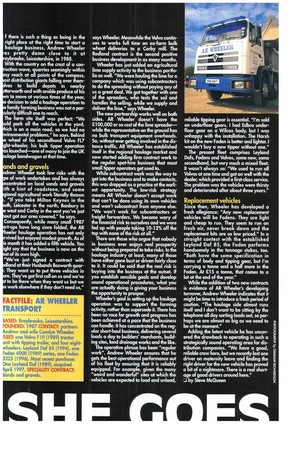nds and gravels
Page 53

If you've noticed an error in this article please click here to report it so we can fix it.
drew Wheeler took few risks with the of work undertaken and has always ncentrated on local sands and gravels ith a hint of roadstone, and some ional agricultural work literally thrown . "If you take Milton Keynes in the tit, Leicester in the north, Banbury in west and Corby in the east you've just t got our area covered," he says. Consequently, while many small 1987 rt-ups have long since folded, the AR eeler haulage operation has not only rvived but enjoyed modest growth. As of s month it has added a fifth vehicle. You ght say that the business is now on the st of its own high.
"We've just signed a contract with land at their Husbands Bosworth guar. They want us to put three vehicles in re. They've got first call on us and we've t to be there when they want us but we n work elsewhere if they don't need us," says Wheeler. Meanwhile the Volvo continues to works full time on ex-farm bulk wheat deliveries to a Corby mill. The Redland contract is the second positive business development in as many months.
Wheeler has just added an agricultural lime supply activity to the business portfolio as well. "We were hauling the lime for a company which was using subcontractors to do the spreading without paying any of us a great deal. We got together with one of the spreaders, who tests the soil and handles the selling, while we supply and deliver the lime," says Wheeler. The new partnership works well on both sides. AR Wheeler doesn't have the £100,000 or so cost of the lime spreader— while the representative on the ground has no bulk transport equipment overheads. So, without ever getting involved in the distance traffic, AR Wheeler has established itself in the regional haulage market and now started adding firm contract work to the regular spot-hire business that most small tipper operators get used to. While subcontract work was the way to get into the business and to make contacts, this was dropped as a practice at the earliest opportunity. The low-risk strategy means AR Wheeler doesn't accept work that can't be done using its own vehicles and won't subcontract from anyone else. "We won't work for subcontractors or freight forwarders. We became wary of the financial risk to ourselves and we were fed up with people taking 10-12% off the top with none of the risk at all."
There are those who argue that nobody in business ever enjoys real prosperity without being prepared to take risks. In the haulage industry at least, many of those have either gone bust or driven fairly close to it. It could be said that the real risk is buying into the business at the outset. If you establish sensible goals and develop sound operational procedures, what you are actually doing is giving your business the opportunity to prosper. Wheeler's goal in setting up the haulage operation was to support the farming activity, rather than supersede it. There has been no race for growth and progress has been achieved at a pace that the business can handle. It has concentrated on the regular short-haul business, delivering several loads a day to builders' merchants, building sites, land drainage works and the like.
The operative phrase has been "regular work". Andrew Wheeler ensures that he gets the best operational performance out of his fleet by ensuring that it is reliably equipped. For example, given the many "weird and wonderful" sites at which the vehicles are expected to load and unload, reliable tipping gear is essential. "I'm sold on underfloor gears. I had Edbro underfloor gear on a Wilcox body, but I was unhappy with the installation. The Harsh kit on the new Foden is better and lighter. I wouldn't buy a new tipper without one." The present fleet comprises Leyland Dafs, Fodens and Volvos, some new, some secondhand, but very much a mixed fleet. It wasn't always so: "We used to run all Volvos at one time and got on well with the dealer, which provided a first-class service. The problem was the vehicles were thirsty and deteriorated after about three years."
























































































































